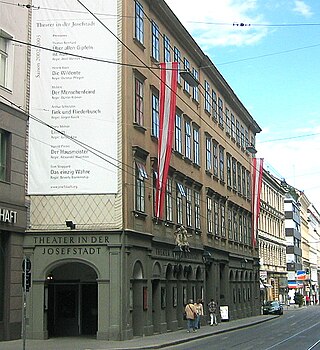
The Theater in der Josefstadt is a theater in Vienna in the eighth district of Josefstadt. It was founded in 1788 and is the oldest still performing theater in Vienna. It is often referred to colloquially as simply Die Josefstadt.

Willy Birgel, born Wilhelm Maria Birgel, was a German theatre and film actor.

Paul Hörbiger was an Austrian theatre and film actor.
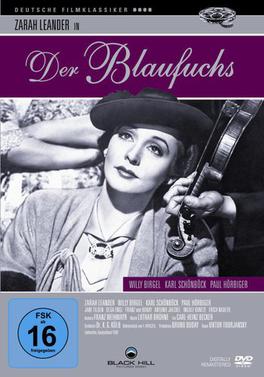
The Blue Fox is a 1938 German comedy film directed by Viktor Tourjansky and starring Zarah Leander, Willy Birgel and Paul Hörbiger. It was based on a play by the Hungarian writer Ferenc Herczeg. It includes the song Kann denn Liebe Sünde sein. It was shot at the Babelsberg Studios in Potsdam and on location in Budapest. The film's sets were designed by the art director Werner Schlichting.

Ride to Freedom is a 1937 German historical war film directed by Karl Hartl and starring Willy Birgel, Viktor Staal and Hansi Knoteck. The film is set in the 1830s during Poland's November Uprising against the Russian Empire. It portrays the rehabilitation of a Polish cavalry officer whose initial reluctance to engage the enemy leads to the death of his comrades, but later dies fighting bravely.

Mirror of Life is a 1938 Austrian drama film directed by Géza von Bolváry and starring Peter Petersen, Paula Wessely, and Attila Hörbiger. The film's sets were overseen by art director Julius von Borsody.

Riding for Germany is a 1941 German drama film directed by Arthur Maria Rabenalt and starring Willy Birgel, Gertrud Eysoldt and Gerhild Weber. A German cavalry officer, badly injured during the First World War, emerges as a leading competitor in post-war equestrian events.
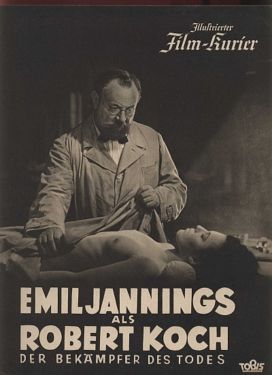
Robert Koch is a 1939 Nazi propaganda film directed by Hans Steinhoff and starring Emil Jannings, Werner Krauss and Viktoria von Ballasko. The film was a biopic of the German pioneering microbiologist Robert Koch (1843–1910). It was shot at the Johannisthal Studios in Berlin and premiered at the city's Ufa-Palast am Zoo. The film was made by the Tobis Film company, and was also distributed in the United States by the largest German studio UFA.
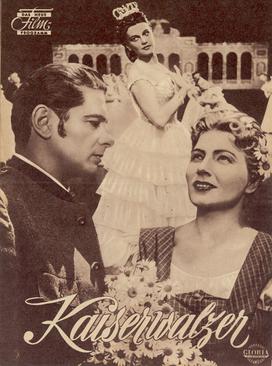
The Emperor Waltz is a 1953 Austrian historical drama film directed by Franz Antel and starring Maria Holst, Rudolf Prack and Winnie Markus. The film's sets were designed by Heinz Ockermüller and Sepp Rothaur. It is set during the era of Empress Elisabeth of Austria.

The Prisoner of the Maharaja is a 1954 West German adventure film directed by Veit Harlan and starring Kristina Söderbaum, Willy Birgel, and Adrian Hoven. It is a sequel to the 1953 film Stars Over Colombo.

So Ended a Great Love is a 1934 German historical romance film directed by Karl Hartl and starring Paula Wessely, Willi Forst and Gustaf Gründgens.

One Too Many on Board is a 1935 German drama film directed by Gerhard Lamprecht and starring Lída Baarová, Albrecht Schoenhals and René Deltgen. It was shot at the Babelsberg Studios in Berlin. The film's sets were designed by the art directors Otto Erdmann and Hans Sohnle. Some scenes were shot on location in Hamburg. A separate French-language version was also released.

We'll Talk About Love Later is a 1953 West German comedy film directed by Karl Anton and starring Gustav Fröhlich, Maria Holst and Liselotte Pulver.
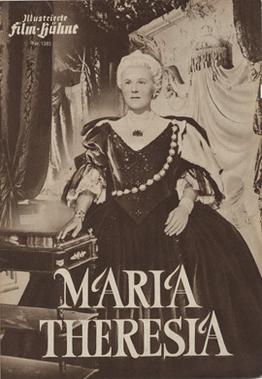
Maria Theresa is a 1951 Austrian historical drama film directed by Emil E. Reinert and starring Paula Wessely, Fred Liewehr and Marianne Schönauer. It portrays the life of the eighteenth century Habsburg Empress Maria Theresa.
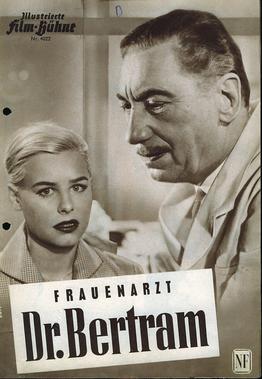
Doctor Bertram is a 1957 West German drama film directed by Werner Klingler and starring Willy Birgel, Winnie Markus and Lucie Mannheim. It is based upon the play by Hans Rehfisch. It was shot at the Bavaria Studios in Munich.The film's sets were designed by the art directors Max Mellin and Karl Weber.

The Witch is a 1954 West German drama film directed by Gustav Ucicky and starring Anita Björk, Karlheinz Böhm and Attila Hörbiger. It was shot at the Tempelhof Studios in Berlin and on location in Vienna, Rome, Venice, Capri and Styria. The film's sets were designed by the art director Emil Hasler and Walter Kutz.

The Governor is a 1939 German drama film directed by Viktor Tourjansky and starring Brigitte Horney, Willy Birgel and Hannelore Schroth. It is based on the play Die Fahne by Emmerich Groh. It was shot at the Babelsberg and Tempelhof Studios in Berlin and on location in East Prussia. The film's sets were designed by the art director Max Mellin. It was produced on a budget of 715,000 Reichsmarks.

Late Love is a 1943 German historical drama film directed by Gustav Ucicky and starring Paula Wessely, Attila Hörbiger and Inge List.

The Emperor's Sweetheart is a 1931 German historical musical comedy film directed by Hans Tintner and starring Liane Haid, Walter Janssen and Wilhelm Bendow. It was shot at the Grunewald Studios in Berlin. The film's sets were designed by the art director Max Heilbronner. An operetta film, it is based on the stage operetta of the same title composed by Emil Berté. It was distributed by the German branch of the American company Fox Film.



















